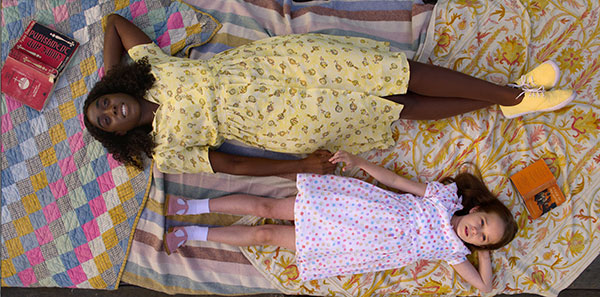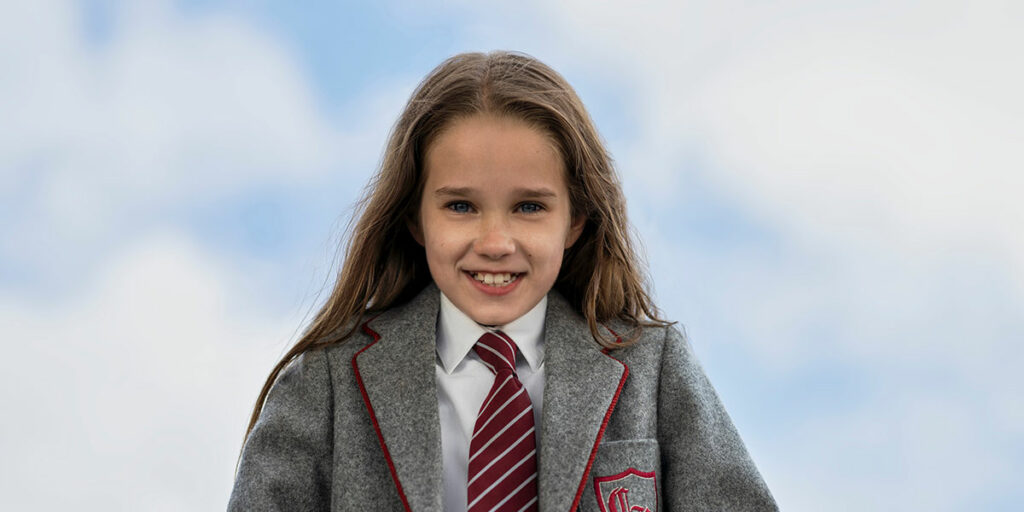Netflix’s Roald Dahl’s Matilda: The Musical lacks the Dahlian menace and flair of its predecessor, though its musical sequences are delightful.
Based on Tim Minchin’s hugely successful stage musical, Roald Dahl’s Matilda: The Musical is not the first screen adaptation of Roald Dahl’s delightful classic; Danny DeVito’s 1996 interpretation remains one of the greatest ‘family’ films of all time, a rare one that does not infantilise its children and instead gives them agency, a voice and a chance to explore their imaginations against great adversity.
Matilda is Roald Dahl’s enduring classic about a young girl who lives with her aloof, arrogant, anti-intellectual parents, who are so neglectful that they forget to send her to school. Matilda Wormwood (newcomer Alisha Weir) spends most of her time reading novels, which allows her to live vicariously through the great writers of the English canon. When the authorities investigate her parents and force her father (Stephen Graham, The Irishman) to find a school for his daughter, he finds that Crunchem Hall have a place, an imposing fortress ruled by the tyrannical Miss Trunchbull (Emma Thompson, Good Luck to You, Leo Grande). Matilda’s kind-hearted teacher Miss Honey (Lashana Lynch, No Time to Die) takes a liking to Matilda, and the pair develop confidence together. An empowered Matilda discovers she has a super power, which she uses to take her headteacher down a peg.
Where DeVito’s film Americanised the story in several ways to give it more mainstream appeal (none of these aspects actually weakened the film), Matilda: The Musical uses a predominantly British cast, and its production design is much more refined. Compared to DeVito’s version, it is much less rough and features that flat Netflix sheen that carries across most of their productions, and the garish colours of the hospital in the opening immediately establish a new aesthetic.

DeVito’s version is more true to the spirit of Dahl’s writing – the climactic scene in which Matilda uses her psychic powers to write on a chalkboard from a distance to convince Miss Trunchbull she is haunted was genuinely terrifying, thanks to a perfect combination of Pam Ferris’s performance, the intense close-ups, musical score and quick cuts, but here, the scene is subdued and lacking cinematic flair; it just feels like a box-ticking exercise and is frankly forgettable.
The 1996 version is much better at centring us with Matilda – we really feel there that the adults are insurmountable. Here, they’re almost like pantomime villains, and I feel that’s to the film’s detriment. And when Miss Trunchbull throws Amanda Thripp (Winter Jarrett-Glasspool) by her pigtails, there is a clumsy CGI weightlessness that feels very unsatisfying. In terms of Matilda’s other classmates, DeVito’s film really rounded out Bruce Bogtrotter (here played by Charlie Hodson-Prior) and allowed Lavender (Rei Yamauchi Fulker) to flower, but in Matilda: The Musical, the other children are an afterthought, offering the odd line here and there but not given the material to flourish. They are left blank figures as opposed to actual characters, which is a shame as Dahl’s novel provides plenty of inspiration.
If you have the attention span of Mr. Wormwood, the nearly two-hour runtime may look daunting, but I think it’s paced well, and it never drags. It’s very kinetic, with snappy editing and lively camerawork, but it slows down when necessary. Unfortunately, while Lashana Lynch is excellent as Miss Honey, she isn’t really given enough screentime; a lot of her moments with Matilda are instead deferred to librarian Mrs Phelps (Sindhu Vee, Sex Education), with whom there isn’t as strong a dynamic. The casting is commendable – newcomer Alisha Weir is solid as Matilda, Lashana Lynch bears the gentleness and slow-growing assertiveness of Miss Honey perfectly, and Stephen Graham is having a gas as Mr. Wormwood. Emma Thompson is not a bad Miss Trunchbull, but the script and overreliance on CGI set pieces does not allow her the menace that the character should rule with.
While most of the film is unremarkable, director Matthew Warchus (Pride) is especially deft at directing the musical sequences, which are definitely the best scenes in the film, and the sequences are very well-choreographed and edited. He is currently Artistic Director of the Old Vic, (a theatre I love), since Kevin Spacey stepped down, and his theatre background is evident – the attention to detail is second-to-none and the scenes are visually as propulsive as the songs they accompany – I can see myself revisiting the musical scenes, though not the wider film itself. He does create a new visual aesthetic which is more akin to Tim Burton’s Charlie and the Chocolate Factory than any other screen Dahl adaptation.
Having never heard any of the songs before, I was impressed. They’re charming and very witty lyrically, and performed with flair by the cast. Several have an anthem quality which works wonderfully with the story’s themes of empowerment, and the several school classes that attended my screening had a ball. One of the things that this film really nails, however, is the attention it brings to Miss Trunchbull’s character. Her past is no excuse for her cruelty, but there is tragedy in how she pines for her past as a successful athlete; there is an underlying tension between her and Miss Honey that is present from the outset. She is so much more than just a caricature, though in this new Matilda she is just not menacing enough.
Roald Dahl’s Matilda: the Musical is an enjoyable film which really shines in its musical sequences. While it is more sanitised than Dahl’s novel, a lot of the storytelling choices in DeVito’s film worked better, and beside the songs from Minchin’s musical, this new version does not add enough to make it truly memorable, though its performances are mostly spot-on. It’s undeniably entertaining, but it won’t be a classic, and that’s okay. Worth watching.
Roald Dahl’s Matilda the Musical was the opening film at the 2022 BFI London Film Festival on October 5, 2022. The film will be released theatrically in the UK & Ireland on November 25 and in the US on December 9, and will be released globally on Netflix on December 25.

